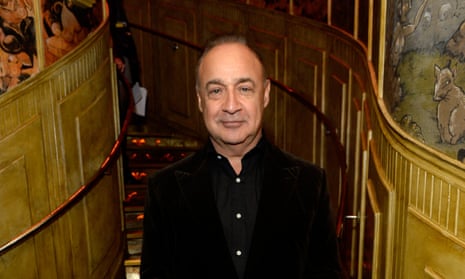His charitable donations have been described as some of the most generous ever made in the UK, but unease about Sir Leonard Blavatnik’s philanthropy has grown after a leading political academic quit the University of Oxford.
The Ukraine-born billionaire gave £75m to Oxford to set up the Blavatnik school of government, one of the largest donations in the history of the university. But last week Bo Rothstein resigned as a professor of government and public policy at the institution after it emerged that Blavatnik had donated $1m (£773,000) to Donald Trump’s inauguration committee.
A spokesperson for Blavatnik said his gift was for the committee that has been responsible for organising US presidential inaugurations since 1901 and that he had never donated to Trump. But Rothstein, a specialist on corruption, called the donation “incomprehensible and irresponsible” in his resignation letter.
The academic subsequently told the Guardian he had received hundreds of messages of support about his decision, adding: “I’m not going to be the Blavatnik chair of government and public policy because I’m not going to give legitimacy and credibility to this person. $1m is a sizeable amount of money. In my book by donating to the inauguration of Donald Trump you are supporting Donald Trump.”
Blavatnik, a UK and US citizen, was knighted for his philanthropy this year. His links to Vladimir Putin’s Russia and controversy in his business background mean criticism has often followed his donations, especially when it involves institutions naming buildings after him.
Oxford is not the only institution that has accepted money from Blavatnik and in return put his name on something. Tate Modern named its new extension after him because he made a donation the gallery described as “unprecedented”. The V&A museum is to call its new entrance hall after him too.
Oxford had already been criticised for accepting Blavatnik’s money before the letter from Rothstein. Two years ago, a collection of critics issued an open letter about his donation to the university, urging it to “stop selling its reputation and prestige to Putin’s associates”.
The signatories included Pavel Litvinov, one of the eight 1968 Red Square protesters, and Vladimir Bukovsky, a Russian dissident who exposed the Kremlin’s use of psychiatric treatment on political prisoners.
The letter urged Oxford to look into Blavatnik’s role in a clash between the British oil firm BP and its partners in a Russian venture.
Blavatnik, who turned 60 in June, was one of a group of oligarchs in the AAR consortium which partnered BP to create TNK-BP, one of the largest oil companies in Russia. Blavatnik was a director of TNK-BP.
One of the As in the consortium stands for Access Industries, the company Blavatnik founded in 1986 two years after becoming a US, and which he still uses to make investments today.
After being born in Odessa, Ukraine, he attended the Moscow state university of railway engineering before his family emigrated to the US in 1978. He obtained a master’s and an MBA from Columbia and Harvard universities respectively.
Access began making investments in Russia after the fall of communism as the energy and aluminium groups of the former Soviet Union were broken up. Eventually Blavatnik combined assets with Viktor Vekselberg and Mikhail Fridman to form AAR. Their partnership with BP ended in acrimony.
In 2008, Bob Dudley, then the chief executive of TNK-BP and now the boss of BP, left Moscow after what the British company described as an “orchestrated campaign of harassment”. Armed police also raised TNK-BPs office and more than 100 BP managers had to leave Russia after the authorities refused to renew their visas.
US diplomats alleged that at least one individual in AAR, German Khan, was involved in a state-sponsored campaign against BP to try to force them out of Russia. However, AAR and lawyers for Blavatnik have denied any involvement, including that of Khan, in a plot against BP.
In the end, both BP and AAR were bought out of the venture by state-backed Russian energy company Rosneft. The $55bn (£42bn) deal in 2013 handed the oligarchs, including Blavatnik, $28bn. It was signed off at a meeting with Putin.
The cash from the sale of TNK-BP pushed him to the top spot of the Sunday Times rich list in 2015. By this stage Access had already diversified beyond Russia and the energy sector.
Blavatnik became of one the most powerful men in the music industry when he bought Warner Music for $3.3bn in 2011. Two years later Warner bought Parlophone, adding David Bowie and Coldplay to its catalogue of artists. Blavatnik is now a regular at major music events and Ed Sheeran, who is signed to Warner, played at his daughter’s bat mitzvah.
Blavatnik first started attracting headlines in the UK in 2004 when he paid £40m to buy a property in Kensington Palace Gardens in London. After substantial work on the house it is now estimated to be worth £200m.
Previous reporting about Blavatnik, who becaame a UK citizen in 2010, suggests he is keen to address preconceptions about him and protect his reputation.
With this is mind, Rothstein’s resignation from Oxford and the fallout are likely to be uncomfortable for Blavatnik.
